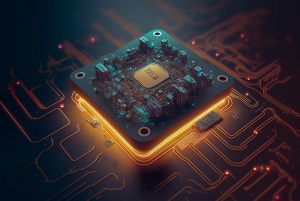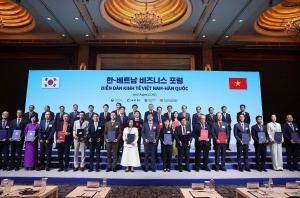On August 22, CT Group, in collaboration with the Vietnam National University Hanoi, organised a scientific seminar titled “Ensuring security and technological autonomy in Vietnam’s chip manufacturing amid national digital transformation.”
| A panel discussion on how to build an independent and autonomous semiconductor industry |
Chairman of CT Group Chan Kim Chung emphasised the urgent need for independence and autonomy in science and technology. “Total dependence on foreign chips could put Vietnam at risk of data disruption or leakage during its robust digital transformation, particularly during the digital twin phase, when both data volume and connected devices surge dramatically,” he said.
Mastering the technology to design, manufacture, and commercialise semiconductor chips is not only a scientific and technological responsibility but also a critical requirement for national security. In the digital age, semiconductor technology has been the foundation of all modern industries, acting as the “brain” of the world. From smartphones, computers, and electric vehicles, to AI, 5G and 6G networks, and defence equipment, all rely on ultra-small but immensely powerful integrated circuits.
“If we do not control production, we could lose national data or be unable to respond proactively in emergencies. We must create ‘Made by Vietnam’ products to serve both civilian and defence needs, and to compete fairly in the global market,” he asserted.
The CT Group chairman proposed the formation of a strong, independent, and autonomous semiconductor industry, focusing on fewer than 10 essential chip types, such as microcontroller unit (MCU) chips, AI chips, IoT chips, and chips for telecommunications and satellite frequencies.
“Developing domestic chips would also help position Vietnam as a semiconductor hub in Southeast Asia and boost its global competitiveness,” he added.
Chung said that based on the successful research and design of the analogue-to-digital converter semiconductor chip, announced in early July, it typically takes about two years to design a chip. Producing a chip involves several stages like research, design, photolithography, testing, and packaging.
More complex chips such as MCUs, telecom chips, and remote sensing chips require even more intricate processes. “Therefore, if Vietnam begins working on all essential chip types now, they would only be available by 2027, while digital transformation is rapidly accelerating, and every hour saved is invaluable,” he emphasised.
The CT Group chairman asked authorities like the Ministry of Public Security and the Ministry of Defence to decide and propose to the government which chip lines must be developed domestically.
“Enterprises are ready to collaborate with the Vietnam National University to research, develop, and meet the demand. That is the way for us to be proactive and autonomous,” he said.
Thai Truyen Dai Chan, a member of CT Group’s scientific council, noted that the current global competition over semiconductor chips is not just about trade, it is a geopolitical battle. Whoever controls semiconductors will control much of the world’s future technological power.
“Therefore, if a nation cannot master integrated circuits, the risks are immense,” he emphasised. Economically, even a small disruption in the global supply chain, such as a pandemic or trade conflict, could cripple entire industries, directly affecting GDP, employment, and social stability.
From a defence and security perspective, modern military systems, including radar, satellites, unmanned aerial vehicle (UAV), to precision weapons, all rely on semiconductor components. If supply is cut off, defence capabilities will suffer. More dangerously, imported chips may contain security backdoors, posing risks of unauthorised access and threats to national sovereignty.
“Moreover, dependency can stifle technological innovation,” he added. “A country aiming to develop AI, IoT, EVs, or next-generation telecommunications infrastructure needs the appropriate microchips. Relying solely on imports means higher costs, slower innovation, and a constant threat of external manipulation.”
| A signing ceremony of strategic cooperation between the Vietnam National University Hanoi and CT Group |
Agreeing with this, Le Hai Trieu, director of the Institute of professional electronic engineering under the Ministry of Public Security’s Department of Security Industry, said that while some domestic firms are doing well in chip design, manufacturing still takes place abroad, posing both security and cost risks.
He proposed that chips currently used in Vietnamese ID cards and passports are widely adopted globally. This chips line accounts for 95 per cent of the global market and will continue to be relevant for the next 20-25 years. “Therefore, local semiconductor companies should focus on producing these products,” Trieu emphasised.
He also added that manufacturers should connect researchers, policymakers, and tech businesses to promote autonomy in core technologies for sustainable digital transformation.
Currently, the Ministry of Public Security has tasked the Institute of Professional Electronic Engineering with leading the development of a project titled “Research, develop, and transfer technology to master semiconductor chip technology for national defense and security,” to be submitted to the prime minister this year.
Experts believed that Vietnam needs a realistic and selective roadmap for chip autonomy. Competing in the ultra-advanced semiconductor segment, requiring tens of billions of dollars and decades of technological development, is difficult. However, Vietnam can focus on practical areas aligned with domestic demand. For example, low- and mid-power microchips for IoT, sensors, smart devices, and 6G infrastructure represent large markets and match Vietnam’s current capabilities.
Enterprises can focus on secure circuits for e-government, national defence, UAVs, and smart identity, where Vietnam has strengths due to its cybersecurity research. They can also invest in application-specific integrated circuits for smart traffic systems, edge AI, and defence applications. Other potential areas include power management and EV chips, such as battery management, motor control, and energy conversion, aligning with Vietnam’s green industrial development strategy.
| Semiconductor industry in Vietnam can now go global
Vietnam’s semiconductor and electronics sector is gaining momentum, fuelled by rising global demand and government support. Do Thi Thuy Huong, an executive board member of the Vietnam Electronic Industries Association, spoke with VIR’s Hoang Oanh about key strategies to develop a globally competitive ecosystem. |
 |
Localities look into microchip gains
Many localities are proposing special mechanisms to engage large-scale foreign investors to develop ecosystems for the semiconductor industry. |
 |
FPT partners with ABOV Semiconductor on chip development
FPT has signed strategic agreements with ABOV Semiconductor and Gachon University to advance semiconductor technology development and foster high-quality human resource training between Vietnam and South Korea. |




